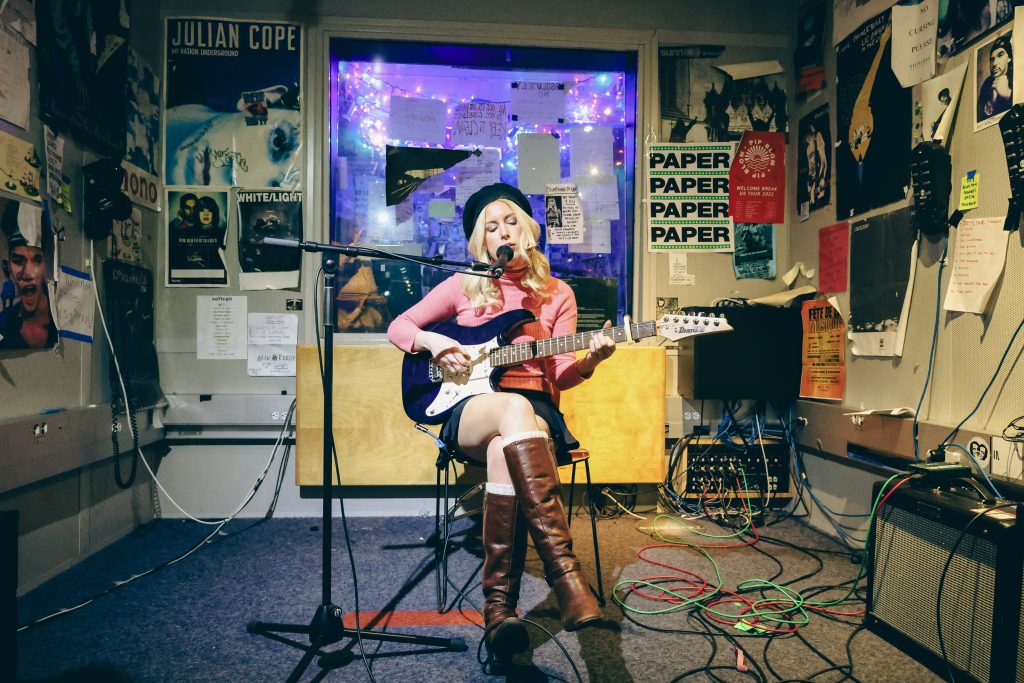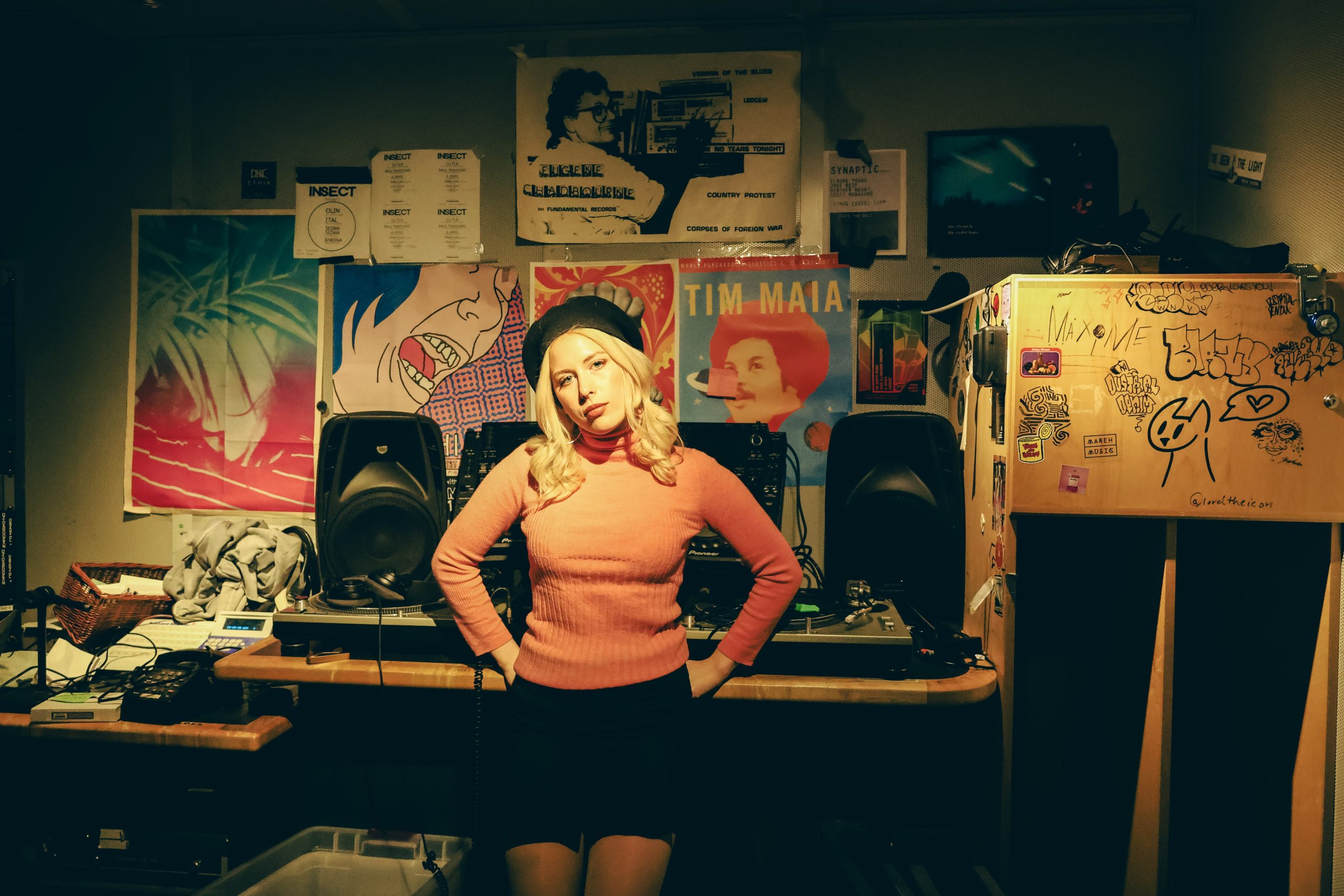On October 21, Holly Macve performed an intimate show at Mercury Lounge to an attentive, admiring crowd. The British singer-songwriter played solo, switching between piano and guitar with her dreamy vocals as the centerpiece. To witness Macve perform that night, was to witness an artist slip into a world of her own creation, inviting us to join her along the way– a world particularly evident in her recently released third album Wonderland.
From her debut Golden Eagle, Macve cemented herself as a gifted storyteller and distinctive vocalist with a discography full of melancholic, timeless melodies, and lyrics imminent of solitary reflection. Following a succession of country-led albums, the British singer-songwriter’s latest work is laden with dreamy, diaristic ballads that reflect on her life, as she carries us through the complicated emotions that follow a breakup, gentle and compassionate vignettes of her past life, and hopeful projections of her future.
As the first album released independently under her own label Loving Memory Records, Wonderland is the purest realization of Macve’s artistry and perhaps the closest look at the singer-songwriter’s interior life through both its musical and visual components.
Before heading back to England, Macve took some time to sit down with us and discuss all things Wonderland, including the therapeutic nature of songwriting, her inspirations, and her lifelong fascination with Americana and Elvis.
Hi Holly, thank you for making the time to join us here at WNYU. You’re wrapping up your time here in New York– in between your new album’s release and playing a show at Mercury Lounge, how’s it been?
It’s been really fun. This trip has been a combination of some work and also just fun things. I feel like I need to travel. I really find it inspiring for my writing. I have to be in a new place, you know? And, I’ve just been in a bit of a New York era – I love it here.
I love what you said about how traveling inspires your writing. I’ve been listening to Wonderland, and I noticed that many songs are inherently connected to the environment in which they take place. Would you say that your sensitivity to the environment informs your songwriting process?
It depends. I’m a very visual person, so that’s the thing that often inspires my songwriting the most. Whether it’s traveling and seeing a landscape that inspires me or being in a house– any kind of strong imagery is what inspires me to create a scene from the environment. But it doesn’t always come. Sometimes I’ll be in somewhere where I feel like I should be really inspired and I’m just not, and that’s always very frustrating. It’s a little bit random sometimes.
The creative process can be spontaneous in that way.
Definitely.
Are you the type of person that waits for that inspiration to come or do you try to push through when you’re writing?
I am one of those people that waits for it to come. I find that if I sit and try to write songs and it’s not coming then it puts a negative spin on the experience of songwriting for me. I feel like it’s genuinely a magical experience when it just comes from somewhere and you don’t know where it’s come from. That’s always what I’m seeking, but it’s not always available, which can be frustrating. All my music is pretty diaristic, especially my last album. It’s very personal usually, and I think that’s another element of it. When things are going on in my life, it’s a way for me to express myself. It’s like my therapy. Writing, like you would write in a journal. I just kind of do it in song form and then it becomes a bit like a time capsule, when you look back at it.
For you and for all of the listeners who can resonate with the same things that you’re going through.
Definitely. If I can just connect with someone that’s gone through the same experience, that’s why I do it really, or at least, why I release it into the world.
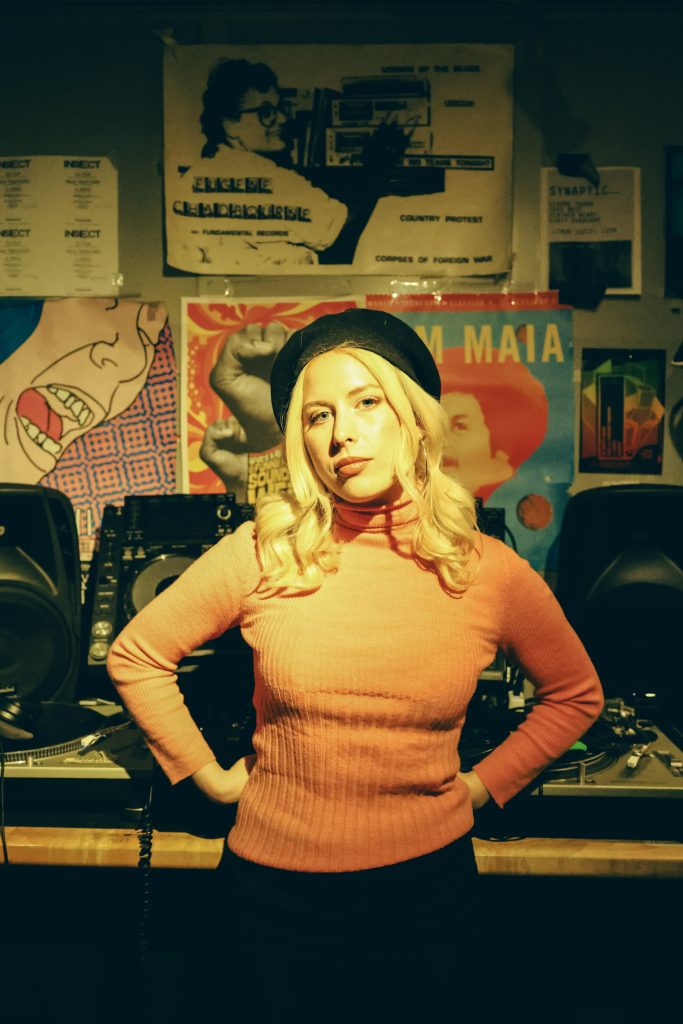
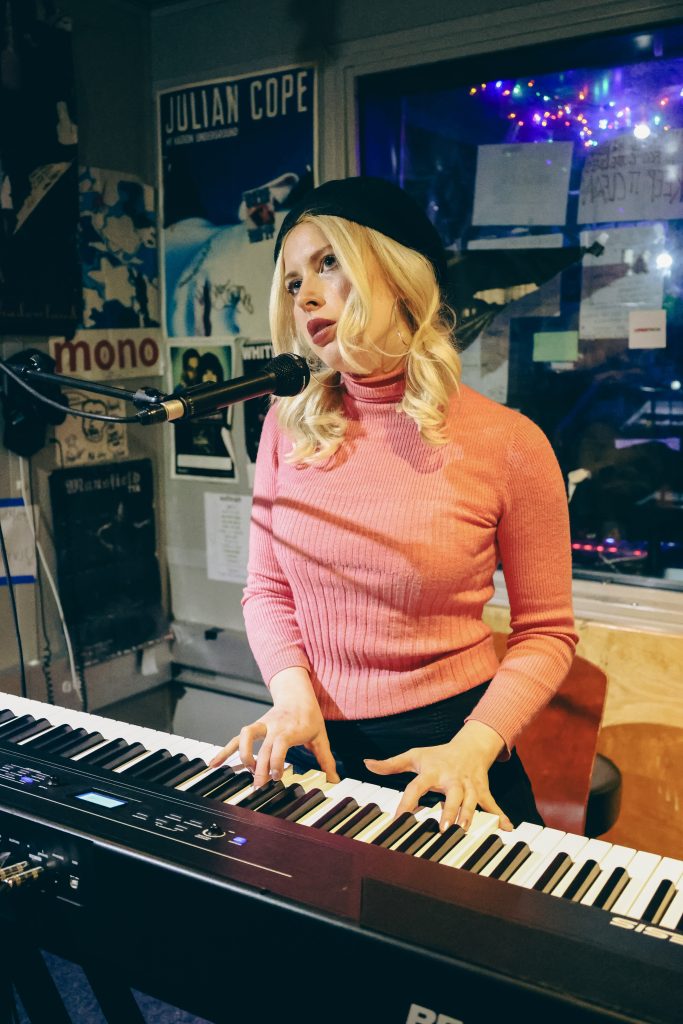
I’m curious about “Wonderland”, the title track. You chose to begin the album with that song and it was the opener to your performance at Mercury Lounge. How did you settle on that as the first track and what does the song mean to you specifically?
Well, funnily enough, that song was actually the last song written for the album, but it felt most appropriate to put first because it felt like it set the atmosphere for the album, especially with the string arrangement. I worked with a really amazing string arranger, who was able to make this Wonderland-esque arrangement, which I feel is a little bit like 1950s Disney style, you know, the 1950s Wonderland. I wanted to start [the record] on a hopeful note. Personally, I was coming out of a time where I was struggling, and I was just searching for the light again, I suppose. “Wonderland” is very focused on romanticizing the future versus the past, and that’s what I wanted it to mean.
Speaking of the string arrangement, this album, in some ways, is a departure from the sound of your first two albums. You have a very specific vision and aesthetic for both the visuals and the music, and it’s your first release under your own independent label. How did you find it being so hands-on, as not only artist, but also all of the other roles you had during the process of making and releasing the album?
There’s pros and cons. I think the pros are that it feels like the most me out of all of my music that I’ve released. Doing it yourself is a lot of work, but then it’s very, very rewarding. I edited all my videos, and it was just me and my best mate doing all of them together. You learn a lot when you do it that way as well, and you make something that feels very pure to you when you’re doing the whole thing. And I’ve always enjoyed the aesthetic world within films. That inspires my music a lot as well.
Do you have any specific films that you took inspiration from when you were working on this project?
There’s actually a little reference to Betty Blue. Have you ever seen that?
I haven’t. No.
I feel like it was a little bit of a classic late ‘80s art school film, and visually, it’s just really beautiful. It’s really romantic and strange and cinematic. I’d recommend it. Yeah, that was one film that inspired me, and it did actually make it into one of my songs called “To Be Loved”.
Ooh, I’ll have to watch it! In terms of production, how did you approach the album?
I worked on home demos– that’s what I always do – I will just sit in my room and be a complete hermit and just do these demos. I always try to create a sort of atmosphere with them. And then I found a couple of people– Dan Rothman, particularly, who did half of the record with me. He was able to see vision and know which musicians to bring in. He really got that cinematic thing that I was going for, and he is very good at creating soundscapes, so there’s quite a lot of underlying noises, almost like sound effects, that he did, and I love them. I feel like I learnt lots through that process. You always do when you work with new producers, and then you can take that into your own production as well.
I love the sound of “Cold Water Canyon Avenue”.
That one was actually just me in my bedroom! It wasn’t completely intentional that I was going to produce that one myself. It was again, one of the last songs that I’d written. I had a little bit of a timeline, but I just was inspired one day, and then I spent a couple of days on it. I thought about taking it in somewhere else, but I was happy with it as is, and I think it gave me the confidence to know I can do that too. I haven’t really done many things, just a hundred percent myself in terms of producing, engineering and songwriting, but it gave me that confidence, and maybe in future projects, I will do that.
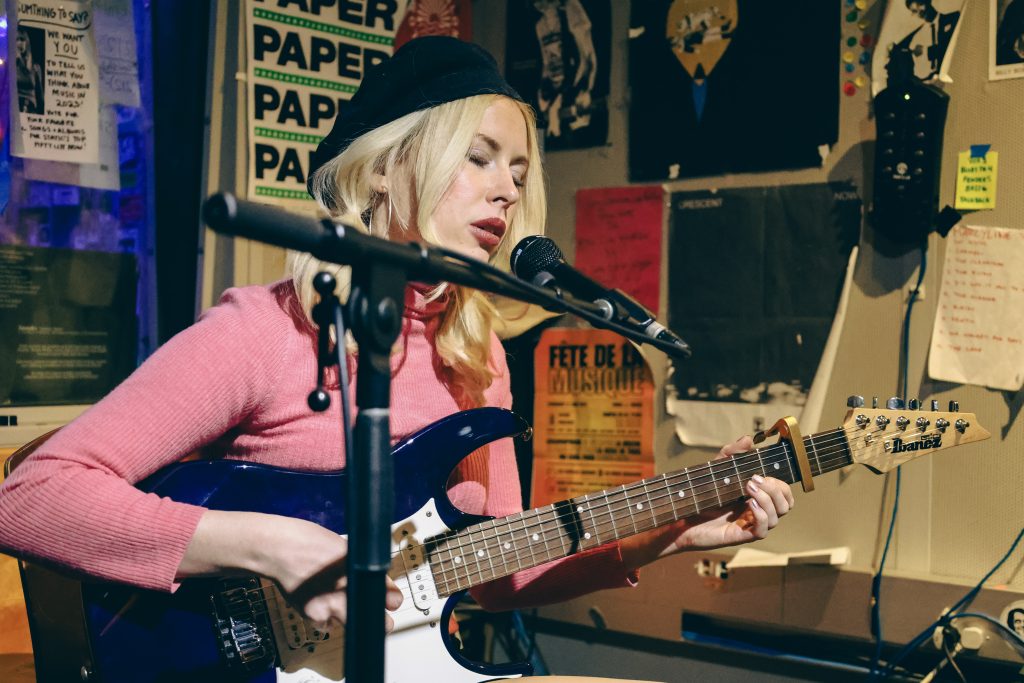
Your overall sound throughout your discography exhibits a deep rooted fascination with the Americana sound and style. When you were growing up [in England], what provoked that interest?
My mom and my grandma are both massive Elvis fans, so that was in the house all the time. I was probably like three years old, but I vividly remember watching Jailhouse Rock on VHS, and being really excited by the imagery of it– it just felt iconic. And then I got into Marilyn, and old Hollywood. I also used to love Ginger Rogers and Fred Astaire, and The Wizard of Oz– all of that kind of stuff. It all feels a little bit otherworldly, and I’ve always been very drawn to that. Maybe America feels a little bit like that to me sometimes because it’s not where I grew up, and when I have done tours, I’ve gone to travel in crazy, big landscapes – things that feel kind of otherworldly to me, and that feels exciting.
I picked up on some Marilyn-like visuals in the “Beauty Queen” video. I love going back and watching her old movies.
Me too. It’s very comforting.
Do you have favorites?
I love Some Like It Hot. That’s probably one of my favorites, but also The Misfits. That’s one of the last films she ever made, so it’s kind of sad for that reason. It’s really great and very different as well. It feels a little bit more serious than some of the others.
I haven’t seen The Misfits. I’ll definitely check that out as well as Betty Blue.
It does open with a very raunchy sex scene.
Betty Blue?
Yes, but it’s not just a porno. There’s a lot more to it. It’s great.
You also released a cover of “Blue Moon” on your label. Was that inspired by Elvis?
Yeah, it was definitely inspired by the Elvis version of that song. I can’t really put my finger on what it is exactly [about him] that I was so drawn to. I guess it’s the sound [of his voice]. It made me feel something, particularly when I was growing up, maybe also because we listened to Elvis at Christmas time every year. It was always something that felt cozy and nostalgic.
Do you think his voice inspired your own singing style?
Yeah. I think it must have in a way.
You have a very distinct vocal style. Is it something that just is natural to you or has it been cultivated over time?
It definitely feels natural for me to linger on notes and draw them out and slur them. When I was about 17, I had a publishing deal, and I did a lot of co-writing. It was ultimately a good experience because I learned a lot about the skill of songwriting, but in those sessions, I would always have producers being like, “can you just sing that a little bit shorter or snappier”, and it’s just never been my natural state. I also feel like, over time, I’ve harnessed [my voice]. It’s an instrument that’s always evolving and I’m always learning how to use it.
Certainly. You’ve spent a fair amount of time working in the music industry and have stayed very true to yourself, it seems.
Thanks. Yeah. The music industry – it’s not for the faint of heart. It’s hard to stay motivated because there’s so many knockbacks, but then, you know, you’ve just got to stick at it if it’s something you really feel passionate about.
Absolutely. Speaking of an artist who’s been in the industry for a while as well– the singular feature on this album is a collaboration with Lana Del Rey on “Suburban House”. I understand you’ve had a connection with her for some time and now we have the pleasure of hearing you sing alongside each other.
Yeah. She’s always been really supportive. She was a fan of [my] first record, and over the years we’ve built a bit of a friendship. I feel like she’s kind of looked out for me like a guardian angel, you know, and I feel very privileged. I remember the first time I heard her singing the verse. It felt very much like it was meant for her. There’s something about that song that feels kind of magical to me, in terms of how it came together. I feel like [that verse] was somehow always meant for her, and it was amazing to work with her – she’s a pro in the studio. It’s really inspiring to watch.
Yeah, you sound so beautiful together on the track. It does feel like it was a match made in heaven, truly.
Thank you.
Thank you for joining me today. As we wrap up, I’m curious to know – if someone was listening to Wonderland for the very first time, what would you want them to take away from it?
It really is down to interpretation, but I guess I’d hope that people feel some kind of hope from it. Out of all of the songs that I’ve written over the years, I feel like [this album is] the most hopeful. I’m sort of reflecting on the past, but in a kind way to myself. I think with “Beauty Queen”, for example, I’m reflecting on a bad situation, but I’m trying to do it with compassion. So I hope that, in some way, [Wonderland] is comforting for those who listen.
